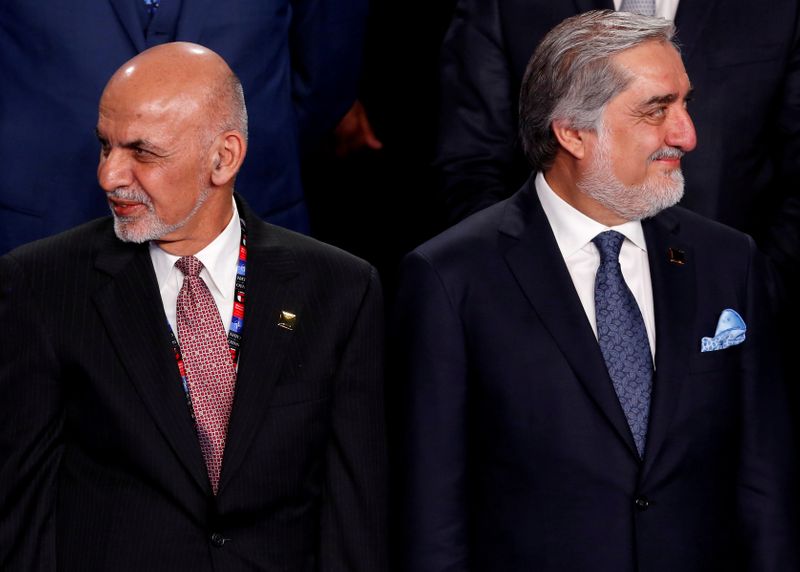By Abdul Qadir Sediqi
KABUL (Reuters) - Afghan President-elect Ashraf Ghani on Monday delayed his planned inauguration ceremony until the afternoon, as his rival Abdullah Abdullah also postponed a scheduled competing swearing-in ceremony.
Both men have laid claim to Afghanistan's leadership following a disputed election in September, a situation that threatens political chaos just days after the United States and the Taliban signed a deal on the withdrawal of U.S.-led international forces.
The delay of the competing ceremonies would allow more time for Ghani and Abdullah to continue days-long talks with U.S. special envoy Zalmay Khalilzad as he tries to shepherd a deal between the two political camps, an official for Ghani said.
"We are in serious negotiation with Abdullah team since last night, and it is still underway," the official said, requesting anonymity because he was not authorized to speak media. "We hope to reach an agreement with Abdullah team."
The official said Ghani's ceremony had been postponed until 1pm, confirming a tweet from Ghani's spokesman Sediq Sediqqi. Abdullah had earlier offered to postpone his ceremony, if Ghani did the same, in response to an appeal by Khalilzad, Abdullah's spokesman, Omid Maisam, said.
Afghanistan's Election Commission last month announced that Ghani had retained power by winning the Sept. 28 election. But his long-time rival, Abdullah, rejected that and proclaimed himself winner.
The political crisis comes as the government is meant to be preparing for talks with the Taliban, to follow up on the Feb. 29 pact between the United States and the insurgents on the withdrawal of U.S. troops after 18 years of war.
Western diplomats in Kabul said it was unclear how the situation might be resolved.
"If Ghani is determined to hold his swearing-in then Abdullah may suddenly decide to hold it too ... it's all up in the air for now," said one diplomat, who has invitations from both of the rival camps, requesting anonymity because they were not authorized to speak to the media.
Another diplomat, also speaking on condition of anonymity, said that amidst uncertainty, many foreign envoys were waiting for a "green signal" from the United States on whether to attend Ghani's ceremony.
Ghani and Abdullah both held roles in the previous government under a U.S.-brokered power-sharing agreement that followed the previous election in 2014.
A former foreign minister, Abdullah held the specially created post of chief executive in the outgoing government.

The Independent Election Commission (IEC) announced Ghani the winner on Feb. 18. Under election law, the swearing-in ceremony for president must be held within 30 days of that announcement.